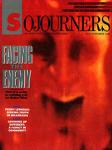I believe the children are our future.
Teach them well and let them lead the way.
Show them all the beauty they possess inside.
Give them a sense of pride to make it easier.
Let the children's laughter remind us how it used to be.
These words from the song "The Greatest Love of All" had an even greater impact than usual upon me as I listened to a group of neighborhood girls sing them at this past summer's first annual Sojourners Neighborhood Center summer camp talent show.
Among those singing was Shron Hill, a soon-to-be 12-year-old girl with the smile of an angel, a tongue as sharp as a two-edged sword, and a left hook to rival Joe Frazier's. To consider the future of black America while reflecting back upon the busted lip of Paul Ross, who came too close to Shron's left hook three weeks prior to camp, confronts me with the reality of the songwriter's words. The children must be taught well; the beauty they possess inside must be shown to them, and a sense of pride is something that we black adults must give them.
My past year's experience of helping teach and coordinate Bible studies and developing relationships with the children and families of our Washington, D.C. neighborhood has made me realize that in the midst of the concrete jungles in our inner cities there must be inspirations to brighten up the days of children such as Paul and Shron. They are needed in neighborhoods where grass is a rarity and a basketball hoop a luxury; in neighborhoods where you find more brothers sitting on the corner passing a jug of wine than you have sitting at the family dinner table passing the salt and pepper; in neighborhoods where the rise in homelessness, unemployment, and prison populations are most vividly portrayed.
I discussed the needs of the neighborhood children with Sabine Jean-Paul, a pre-med student at Howard University, a predominantly black institution just four blocks from Sojourners Neighborhood Center. Sabine has volunteered with the children's program at the center. "This neighborhood's nothing compared to the one I grew up in," said Sabine as she reflected upon her childhood in Brooklyn, New York. It was the schoolteachers who constantly amazed her by coming back day after day. "I can understand now why they kept coming back; it's important that we don't give up on these kids," she said.
MUCH HAS BEEN said recently about the crisis facing black families in America. No doubt about it, the black family faces a time of crisis, and it is not a time to be giving up. But this is nothing new in the history of blacks in America. What is new are the distinct realities in which we blacks find ourselves in 1986.
It used to be the case that on the campuses of colleges across the nation, blacks caucused in black student organizations to discuss issues facing them as black students. Today the issues are secondary in the life of these organizations, as their primary task is to get black people back together with one another, period.
Affluence and affirmative action opened the floodgates of the inner cities, enabling many blacks to move into the suburbs. However, at a very deep level this further separated us from each other. It also diminished the numbers of those who contributed to the task of teaching the children of our inner cities, instilling a sense of pride in them,and showing them all the beauty they possess inside. Sure, the schoolteachers are still here, but what about the neighbors? Who's left once that last bell rings and the teachers pack up and go home?
It is here in the neighborhood, says Sabine, that "Howard has so much to offer, and we as students have no excuse not to get involved in programs such as this." Local colleges and universities have proven to be a tremendous source of volunteers, enabling the children's after-school and summer programs at the neighborhood center to continue. This past year we have witnessed an increase in the number of black volunteers within our programs, particularly black male volunteers. The gifts offered to us by Howard University have been cherished.
But where do we go from here? The word of Martin Luther King Jr., from his book Where Do We Go From Here: Chaos or Commnity?, still point a way forward:
To say that all too many members of the Negro middle class have been detached spectators rather than involved participants in the great drama of social change taking place on the stage of American history is not to overlook the unswerving dedication and unselfish service of some. But many middle-class Negroes have forgotten their roots and are more concerned about "conspicuous consumption" than about the cause of justice. Instead, they seek to sit in some serene and passionless realm of isolation, untouched and unmoved by the agonies and struggles of their underprivileged brothers.
Despite the work that has been done since he said that, Martin's challenge still lies before us.
Kevin Johnson was a member of Sojourners Community and worked with the children's program of Sojourners Neighborhood Center when this article appeared.

Got something to say about what you're reading? We value your feedback!
